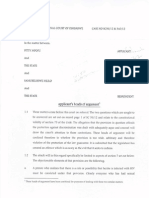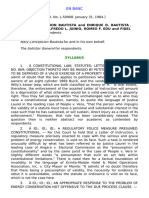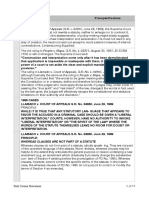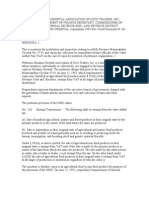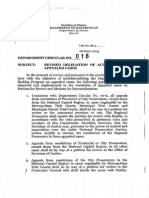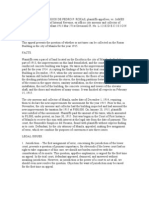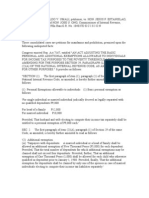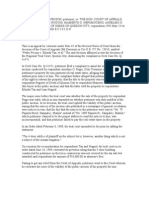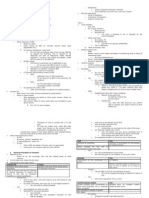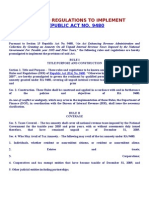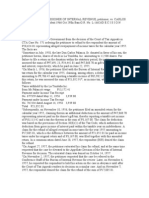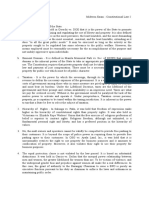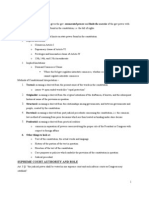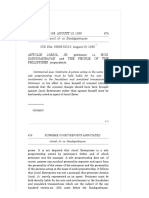Amicus - Bernas
Amicus - Bernas
Uploaded by
cmv mendozaCopyright:
Available Formats
Amicus - Bernas
Amicus - Bernas
Uploaded by
cmv mendozaOriginal Description:
Copyright
Available Formats
Share this document
Did you find this document useful?
Is this content inappropriate?
Copyright:
Available Formats
Amicus - Bernas
Amicus - Bernas
Uploaded by
cmv mendozaCopyright:
Available Formats
Position Paper Amicus Curiae: Bernas, et al.
There is no doubt that the enactment of the Ban Against Aerial Spraying Ordinance by the City of Davao is within its police powers. Even the Court of Appeals, in this case admits so when it said: Unmistakably, it is within the mandate and authority of the City of Davao to enact Ordinance No. 0309-07 since it is a measure that has an ostensible lawful subject. that is, the protection of the public health and the environment against the alleged harmful effects of aerial spraying of pesticides or fungicides. The question there for is whether the ordinance conform to substantive requirements as enumerated in many Supreme Court decisions. In controversies regarding the constitutionality of a statute, law, ordinance, or treaty, the standing position of the Supreme Court, in its numerous rulings, is to grant the presumption of constitutionality and validity. Thus, in Tano vs Socrates (GR No. 110249, August 21, 1997), it held that: It is of course settled that laws enjoy the presumption of constitutionality. To overthrow the presumption, there must be a clear and unequivocal breach of the constitution, not merely a doubtful or argumentative contradiction. In short, the conflict with the Constitution must be shown beyond reasonable doubt. Where doubt exists, even if well founded, there can be finding of unconstitutionality. To doubt is to sustain. The Court in its latest ruling in Social Justice Society vs Atienza, Jr. (G.R. No. 156052, February 13, 2008), reiterated the presumption of constitutionality and validity of a law or an ordinance in this wise, For an ordinance to be valid, it must only be within the corporate powers of the LGU to enact and be passed according to the procedure prescribed by law, it must also conform to the following substantive requirements: (1) must not contravene the Constitution or any statute; (2) must not be oppressive or unfair; (3) must not be partial or discriminatory; (4) must not prohibit but may regulate trade; (5) must
be general and consistent with public policy; and (6) must not be unreasonable. In analyzing the substantive requirements above stated, it will be noted that these revolves around two basis issues; due process and equal protection. And these are discussed below in seriatim. 1. Due Process Our discussions will center on substantive due process and what this means when the issue is the constitutionality or validity of a law or ordinance. The States exercise of it police power has been long recognized in our jurisdiction. In the 1918 case of Lawton vs Steel, the SC recognized the validity of this exercise in this manner: the State may interfere wherever the public interest demands it, and in this particular instance a large discretion is necessarily vested in the legislature to determine, not only what the interest of the public require, but what measures are necessary for the protection of such interests In the same case, however, the Court set out the metes and bounds of the exercise of this power and its own power to be the arbiter of the reasonableness of the legislative act when it held that: The legislature may not, under the guise of protecting the public interest, arbitrarily interfere with private business, or impose unusual and unnecessary restrictions upon lawful occupations. In other words, its determination as to what is a proper exercise of its police power is not final or conclusive, but is subject to the supervision of the Court. Over many years, however, the Supreme Court has traditionally allowed its competence to be limited by the recognition of the presumptive reasonableness of a government action. In the 1918 US vs Salaveria case involving a municipal ordinance, it said: Who is in a better position to say whether the playing of panguingui (on weekdays) is deleterious to social order and the public interest in a certain municipality the municipal council, or the courts?
The answer is self evident. the judiciary should not lightly set aside legislative action where there is no clear invasion of personal or property rights under the guise of police regulation. A survey of cases where the issue of constitutionality was the lis mota, it was observed that the Court rarely declared a legislative measure unconstitutional not only to give due respect and deference to a coequal but also in obeisance to the doctrine of presumptive validity of official action.
On the Equal Protection clause: In order to the overthrow the presumption of validity accorded to the acts of local legislature, there must be a clear showing that the requisites of equal protection have not been complied with. In a long line of decisions, it has been held that equal protection exists when the law operates equally and uniformly on all persons under similar circumstances1 and that all persons or things similarly situated must be treated alike, both as to rights conferred and responsibilities imposed2. It is enough that there are real and substantive distinctions justifying a valid and reasonable classification. This classification, to be valid, must (1) rest on substantial distinctions, (2) be germane to the purpose of the law, (3) not be limited to existing conditions only, and (4) apply equally to all members of the same class3.
1 2
Sison v Ancheta Association of Small Landowners v Secretary of Agrarian Reform, Philippine Judges Association v Prado 3 Tiu v Court of Appeals, citing Ichong v Hernandez
In the circumstances of this particular case, it is evident that the ordinance in question complies with the requirements of equal protection. It operates equally and uniformly on all within its ambit, treating them alike both as to rights conferred and responsibilities imposed. The decision of the CA dated January 9, 2009 striking down Ordinance 0309-07, Series of 2007, is based, among other reasons, on the violation of equal protection due to a failure to classify which substances are prohibited from being applied aerially. This argument is misguided; the classification involved here is the aerial application itself. An evaluation of this classification involves the standards mentioned above, thus: 1. Is it a substantial distinction? YES. Aerial spraying generates drift beyond the confines of the sprayers property to an extent far beyond ground spraying methods. 2. Is it germane to the purpose of the law? YES. The purpose of the law is to protect the health of the inhabitants of the surrounding communities. The unique nature of aerial spraying and the effects of drift justify its segregation from other spraying methods. 3. Is it not limited to existing conditions only? YES. The ordinance in question imposes an absolute ban on aerial spraying, and not merely on existing spraying activities. 4. Does it apply equally to all members of the same class? YES. All aerial sprays are banned, for any purpose, regardless of who the sprayer is. An examination of the standards above readily lead to the conclusion that Ordinance 0309-07 does not violate the equal protection clause of the Constitution, and that petitioners have failed
to overthrow the presumption of validity which is attendant to the acts of the City of Davao. On political question: It is also worthwhile to note that the Court of Appeals, while expressing uncertainty over the safety of the pesticides and fungicides in question, upheld the petitioners on the basis of uncertainty over the causal connection between the aerial sprays and the ailments suffered by the affected communities. In effect, the Court substituted its judgment for that of the local legislature, which had already exercised its discretion on the basis of the evidence available to it. Such judgment, and the resulting action taken, is the prerogative of the legislature involved and constitutes a political question, being as it is a policy decision implemented with the welfare of the community in mind. A political question connotes a question of policy. It refers to those questions which, under the Constitution, are to be decided by the people in their sovereign capacity, or in regard to which full discretionary authority has been delegated to the Legislature or the executive branch of the Government.4
Tanada v Cuenco
You might also like
- Family Law OutlineDocument51 pagesFamily Law OutlineTianna Gadbaw100% (1)
- Mpofu/Mlilo Vs State, Constitutional Court of Zimbabwe, Harare (Case SC96/12 and 340/12Document9 pagesMpofu/Mlilo Vs State, Constitutional Court of Zimbabwe, Harare (Case SC96/12 and 340/12HIV Justice NetworkNo ratings yet
- Luz Farms Vs Sec of DAR (Digest)Document2 pagesLuz Farms Vs Sec of DAR (Digest)Arahbells100% (4)
- Bautista v. JuinioDocument15 pagesBautista v. JuinioJeremy RolaNo ratings yet
- 1984 Bautista - v. - Juinio20210424 14 1ov548gDocument15 pages1984 Bautista - v. - Juinio20210424 14 1ov548gSisinio BragatNo ratings yet
- C44 Churchill & Tait vs. RaffertyDocument28 pagesC44 Churchill & Tait vs. RaffertycharmssatellNo ratings yet
- 2005 December Answers Corporate & Business LawDocument14 pages2005 December Answers Corporate & Business LawDEAN TENDEKAI CHIKOWONo ratings yet
- Bautista Vs JuinioDocument13 pagesBautista Vs JuinioJela KateNo ratings yet
- GENUINO vs. DE LIMA With Dissent of J. LeonenDocument17 pagesGENUINO vs. DE LIMA With Dissent of J. LeonenMulan DisneyNo ratings yet
- Drugstores Association of The Philippines, Inc. v. National Council On Disability Affairs FactsDocument16 pagesDrugstores Association of The Philippines, Inc. v. National Council On Disability Affairs FactsJayson Lloyd P. MaquilanNo ratings yet
- Equal ProtectionDocument10 pagesEqual ProtectionMichelle Alen CalloNo ratings yet
- Taxation CaseDocument30 pagesTaxation CaseNel PasaizNo ratings yet
- Civil Law Review 1 (1st Note)Document36 pagesCivil Law Review 1 (1st Note)Pons Mac PacienteNo ratings yet
- Equal Protection Clause People vs. CayatDocument10 pagesEqual Protection Clause People vs. CayatJustine M.No ratings yet
- Bautista vs. Junio DigestDocument2 pagesBautista vs. Junio DigestLiz Lorenzo100% (1)
- Compilation of Case Digests For Consti 2 (Execution Copy)Document259 pagesCompilation of Case Digests For Consti 2 (Execution Copy)DMRNo ratings yet
- For Leg ProfDocument35 pagesFor Leg Profadonis.orillaNo ratings yet
- Stat Con MidtermDocument11 pagesStat Con MidtermRomel John M. MoitNo ratings yet
- 1 Belgica VS OchoaDocument15 pages1 Belgica VS OchoajafernandNo ratings yet
- Fernando vs. St. Scholastica. G.R. 161107Document16 pagesFernando vs. St. Scholastica. G.R. 161107RenNo ratings yet
- Iuri 275 Exam Notes Su 11Document17 pagesIuri 275 Exam Notes Su 11gibbsontiretse3No ratings yet
- What Is International Humanitarian Law (IHL)Document14 pagesWhat Is International Humanitarian Law (IHL)Joseph PamaongNo ratings yet
- Introduction To Private International Law - A SummaryDocument2 pagesIntroduction To Private International Law - A SummaryRichardNo ratings yet
- Spouses Romualdez Vs COMELECDocument5 pagesSpouses Romualdez Vs COMELECAbigail DeeNo ratings yet
- Natural Resources Case DigestDocument23 pagesNatural Resources Case DigestLorelie100% (1)
- Consti RulingsDocument66 pagesConsti RulingsLorenzo Angelo Acmor OcampoNo ratings yet
- Iuri 275 Notes 11Document17 pagesIuri 275 Notes 11Mona PelaNo ratings yet
- Constitutional Law AssignmentDocument7 pagesConstitutional Law AssignmentJepter Lorde50% (2)
- GR 203335 Disini V Sec of JusticeDocument100 pagesGR 203335 Disini V Sec of JusticePhoebe HidalgoNo ratings yet
- Module 1 Persons and Fam - RelationsDocument21 pagesModule 1 Persons and Fam - RelationsAndrew BelgicaNo ratings yet
- 8 - White Light Corp v. City of ManilaDocument14 pages8 - White Light Corp v. City of ManilaMelfay ErminoNo ratings yet
- Segovia vs. CCC Samar vs. DOTCDocument4 pagesSegovia vs. CCC Samar vs. DOTCCarmel Grace KiwasNo ratings yet
- STTC Framework For PFDocument5 pagesSTTC Framework For PFKeiara PatherNo ratings yet
- Nunez Vs SandiganbayanDocument16 pagesNunez Vs SandiganbayanRRooc asweqNo ratings yet
- Socrates Vs Sandiganbayan Digest Rule 110Document11 pagesSocrates Vs Sandiganbayan Digest Rule 110May AnascoNo ratings yet
- 143481-1967-Ermita-Malate Hotel and Motel OperationsDocument8 pages143481-1967-Ermita-Malate Hotel and Motel OperationsShawn LeeNo ratings yet
- Civil ProcedureDocument152 pagesCivil ProcedureAhmad A. TomawisNo ratings yet
- Digested Cases Montejo Consti 1Document12 pagesDigested Cases Montejo Consti 1Martin Martel100% (1)
- Province of North CotabatoDocument4 pagesProvince of North CotabatoAngelo BasaNo ratings yet
- StandingDocument7 pagesStandingNivneth PeirisNo ratings yet
- Constitutional Law 1st ExaminationDocument28 pagesConstitutional Law 1st ExaminationKristine ConfesorNo ratings yet
- 330 ESQUIBIL Ichong v. HernandezDocument1 page330 ESQUIBIL Ichong v. HernandezCarissa CruzNo ratings yet
- CorpDocument3 pagesCorpRalph GucciNo ratings yet
- British American Tobacco Vs Camacho, G.R No. 163583Document43 pagesBritish American Tobacco Vs Camacho, G.R No. 163583Jomari ParejaNo ratings yet
- StatCon (Finals)Document17 pagesStatCon (Finals)Bernice RosarioNo ratings yet
- Sison Vs Ancheta 130 SCRA654Document3 pagesSison Vs Ancheta 130 SCRA654aldinNo ratings yet
- Dfeert BTDocument24 pagesDfeert BTJustin De JesusNo ratings yet
- Constitutional+Law+ +Second+Semester+NotesDocument106 pagesConstitutional+Law+ +Second+Semester+Notestravis mooreNo ratings yet
- Estrada vs. SandiganbayanDocument1 pageEstrada vs. SandiganbayanYenMojicaNo ratings yet
- Magic PoliDocument46 pagesMagic PoliJasOn Evangelista0% (1)
- Law of DelictDocument54 pagesLaw of DelictYolanda OthmanNo ratings yet
- PALS Civil ProcedureDocument150 pagesPALS Civil ProcedureLou Corina Lacambra100% (2)
- Sison v. AnchetaDocument9 pagesSison v. AnchetaMer CeeNo ratings yet
- Weak Courts, Strong Rights: Judicial Review and Social Welfare Rights in Comparative Constitutional LawFrom EverandWeak Courts, Strong Rights: Judicial Review and Social Welfare Rights in Comparative Constitutional LawRating: 5 out of 5 stars5/5 (2)
- Courts and Procedure in England and in New JerseyFrom EverandCourts and Procedure in England and in New JerseyNo ratings yet
- Demolition Agenda: How Trump Tried to Dismantle American Government, and What Biden Needs to Do to Save ItFrom EverandDemolition Agenda: How Trump Tried to Dismantle American Government, and What Biden Needs to Do to Save ItNo ratings yet
- Bar Review Companion: Remedial Law: Anvil Law Books Series, #2From EverandBar Review Companion: Remedial Law: Anvil Law Books Series, #2Rating: 3 out of 5 stars3/5 (2)
- Wage Computation TableDocument1 pageWage Computation Tablecmv mendozaNo ratings yet
- Misamis Oriental Assn vs. Dept of FinanceDocument6 pagesMisamis Oriental Assn vs. Dept of Financecmv mendozaNo ratings yet
- 1 - Conwi vs. CTA DigestDocument2 pages1 - Conwi vs. CTA Digestcmv mendozaNo ratings yet
- BIR Revenue Memorandum Order 10-2014Document17 pagesBIR Revenue Memorandum Order 10-2014PortCalls100% (4)
- PNP Manual PDFDocument114 pagesPNP Manual PDFIrish PD100% (9)
- Republic Bank V EbradaDocument9 pagesRepublic Bank V Ebradacmv mendozaNo ratings yet
- DOJ Circular No. 18, 18 June 2014Document2 pagesDOJ Circular No. 18, 18 June 2014cmv mendozaNo ratings yet
- Taganito vs. Commissioner (1995)Document2 pagesTaganito vs. Commissioner (1995)cmv mendozaNo ratings yet
- Roxas vs. RaffertyDocument6 pagesRoxas vs. Raffertycmv mendozaNo ratings yet
- Court of Tax Appeals: Republic of The PhilippinesDocument28 pagesCourt of Tax Appeals: Republic of The Philippinescmv mendozaNo ratings yet
- Osmena vs. OrbosDocument9 pagesOsmena vs. Orboscmv mendozaNo ratings yet
- Umali vs. EstanislaoDocument8 pagesUmali vs. Estanislaocmv mendozaNo ratings yet
- Pecson vs. CADocument4 pagesPecson vs. CAcmv mendozaNo ratings yet
- Republic Bank V EbradaDocument9 pagesRepublic Bank V Ebradacmv mendozaNo ratings yet
- Tax NotesDocument10 pagesTax Notescmv mendozaNo ratings yet
- Remedies Under NIRCDocument14 pagesRemedies Under NIRCcmv mendoza100% (3)
- Primer On The Tax Amnesty Act of 2007Document8 pagesPrimer On The Tax Amnesty Act of 2007cmv mendozaNo ratings yet
- Tax 1 - TereDocument57 pagesTax 1 - Terecmv mendoza100% (1)
- BIR Form No. 0618 Download: (Zipped Excel) PDFDocument6 pagesBIR Form No. 0618 Download: (Zipped Excel) PDFcmv mendozaNo ratings yet
- Tax 2 Finals ReviewerDocument19 pagesTax 2 Finals Reviewerapi-3837022100% (2)
- Taxation - 8 Tax Remedies Under NIRCDocument34 pagesTaxation - 8 Tax Remedies Under NIRCcmv mendoza100% (3)
- IRR of RA 9480Document7 pagesIRR of RA 9480cmv mendozaNo ratings yet
- Ra 9480Document6 pagesRa 9480cmv mendozaNo ratings yet
- 9 - Commissioner vs. PalancaDocument1 page9 - Commissioner vs. Palancacmv mendozaNo ratings yet
- Conwi vs. CTADocument10 pagesConwi vs. CTAcmv mendozaNo ratings yet
- Commissioner vs. PalancaDocument6 pagesCommissioner vs. Palancacmv mendozaNo ratings yet
- Remedies Under Local Government CodeDocument15 pagesRemedies Under Local Government Codecmv mendoza100% (4)
- Taxation - 7 Tax Remedies Under LGCDocument3 pagesTaxation - 7 Tax Remedies Under LGCcmv mendozaNo ratings yet
- Tax Alert - 2006 - OctDocument8 pagesTax Alert - 2006 - Octcmv mendozaNo ratings yet
- Appellants Brief Tutuban CaseDocument4 pagesAppellants Brief Tutuban Casecmv mendozaNo ratings yet
- Parada Vs VeneracionDocument9 pagesParada Vs VeneracionAbigael DemdamNo ratings yet
- Air Marine v. Balatbat DigestDocument2 pagesAir Marine v. Balatbat DigestEmmanuel OrtegaNo ratings yet
- Lozano v. Martinez, 146 SCRA 323 (1986)Document3 pagesLozano v. Martinez, 146 SCRA 323 (1986)Digesting FactsNo ratings yet
- Ted Cruz DildoDocument83 pagesTed Cruz DildoAnonymous niuE3ikx7No ratings yet
- Political Law Bar Exam Questions 2014 - MCQDocument2 pagesPolitical Law Bar Exam Questions 2014 - MCQLA AINo ratings yet
- 19 - Pboap Vs DoleDocument17 pages19 - Pboap Vs DoleMia AdlawanNo ratings yet
- Suspended After He Reported Student For Blackmail, Professor Sues University of New MexicoDocument18 pagesSuspended After He Reported Student For Blackmail, Professor Sues University of New MexicoThe College FixNo ratings yet
- Midterm Exam Consti 2 - Salvanera, Jerwin S.Document4 pagesMidterm Exam Consti 2 - Salvanera, Jerwin S.John David Linao Garcia100% (1)
- Con Law OutlineDocument22 pagesCon Law OutlineslavichorseNo ratings yet
- Public Law: ModernDocument25 pagesPublic Law: Modernsorti nortiNo ratings yet
- Consti Cases 10Document120 pagesConsti Cases 10piptipaybNo ratings yet
- Mejia V Pamaran FulltextDocument13 pagesMejia V Pamaran FulltextBeverly UmoquitNo ratings yet
- State Responsibility - Lecture NotesDocument17 pagesState Responsibility - Lecture Noteselmin_ibrahimov100% (3)
- Braga - v. - Abaya - G.R. No. 223076 (Sept. 13, 2016)Document18 pagesBraga - v. - Abaya - G.R. No. 223076 (Sept. 13, 2016)GNo ratings yet
- JMM Promotion Management, Inc. v. CA, G.R. No. 120095, August 5, 1996Document8 pagesJMM Promotion Management, Inc. v. CA, G.R. No. 120095, August 5, 1996Devonee Woop100% (1)
- Henry Davis v. FergusonDocument138 pagesHenry Davis v. FergusonLindsay TolerNo ratings yet
- Hous. Fed'n of Teachers v. Hous. Indep. Sch. DistDocument14 pagesHous. Fed'n of Teachers v. Hous. Indep. Sch. DistJoy PadillaNo ratings yet
- Part II - On Right To Bear Arms: Constitutional or Statutory?Document2 pagesPart II - On Right To Bear Arms: Constitutional or Statutory?Hello123No ratings yet
- Introduction To The Law of Property, Estate Planning, and InsuranceDocument703 pagesIntroduction To The Law of Property, Estate Planning, and InsuranceNhu Y DinhNo ratings yet
- Case 1:05-cv-02386-RBWDocument49 pagesCase 1:05-cv-02386-RBWJessica SchulbergNo ratings yet
- 1919-Visayan Refining Co. v. CamusDocument10 pages1919-Visayan Refining Co. v. CamuszanjknightNo ratings yet
- Leave Division vs. HeusdensDocument28 pagesLeave Division vs. HeusdensTrisha Paola TanganNo ratings yet
- Jairol, Jr. Vs Sandiganbayan - 1990Document20 pagesJairol, Jr. Vs Sandiganbayan - 1990Dani McstNo ratings yet
- Special Civil Actions Case Digest - Rule 66 and 67Document12 pagesSpecial Civil Actions Case Digest - Rule 66 and 67Arvin Antonio OrtizNo ratings yet
- Surigao Mineral Reservation Board Vs CloribelDocument11 pagesSurigao Mineral Reservation Board Vs CloribelLenneo SorianoNo ratings yet
- 108) Ichong vs. Hernandez (G.R. No. L-7995, May 31, 1957)Document36 pages108) Ichong vs. Hernandez (G.R. No. L-7995, May 31, 1957)Carmel Grace KiwasNo ratings yet
- People v. Lacson, October 7, 2003Document21 pagesPeople v. Lacson, October 7, 2003dondzNo ratings yet
- Asia Pacific Chartering v. Farolan DigestDocument2 pagesAsia Pacific Chartering v. Farolan Digestaudreydql5No ratings yet

